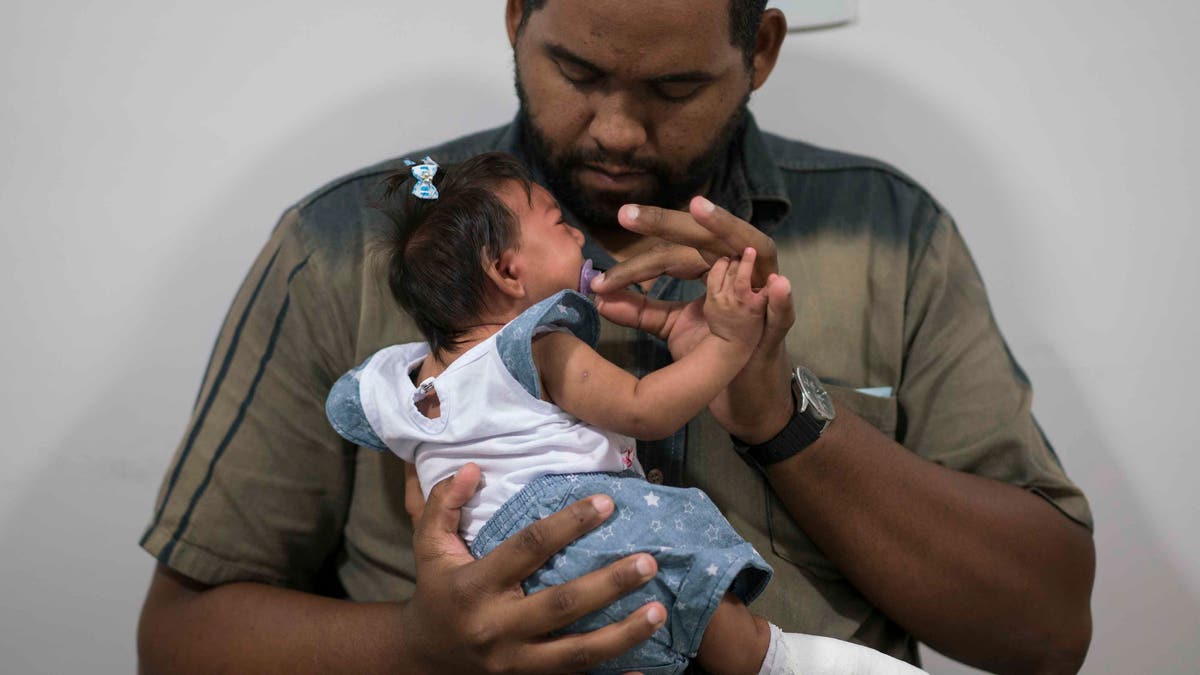
Laurinaldo Alves sostiene a su hija Luana Vitoria, que padece microcefalia, en un centro de tratamiento en Recife, Brasil, 4 de febrero de 2016. (AP Foto/Felipe Dana) (ap)
CARACAS – The outbreak of the Zika virus in Venezuela, mixed with the economic crisis and the government’s secrecy about health data, has created a “perfect storm” that has already killed 11 people.
Those infected, approximately 118,000 since the start of 2016, face the tough task of finding the medicines needed to treat the disease and its possible complications given the acute shortage of goods affecting the country for more than two years now.
While Zika itself is not a serious condition, it has been linked to a rare but severe neurological disorder called Guillain-Barré syndrome, among other things. If not treated right, the condition can cause death or irreversible damage.
The two known treatments, intravenous immunoglobulin and plasmapheresis are currently not available in Venezuela due to lack of supplies.
The 11 Zika patients who have died in Caracas and other cities did not have access to the needed doses of immunoglobulin-g or albumin, according to published reports.
Physician Jose Felix Oletta, Venezuela’s health secretary between 1997 and 1999, warned the situation could get worst in the following weeks.
“The government has announced the import of 3,000 doses of immunoglobulin-g for the first trimester of 2016, but we estimate the real need for that time period is 26,000 doses,” the physician told Fox News Latino.
According to data collected by Oletta from epidemiological divisions around the country, in Venezuela there have been 436,000 probable cases of Zika since July of last year. Experts believe 1 in 1,570 patients infected with the Zika virus have developed Guillain-Barré.
“We could have 750 cases of the neurological disorder in the first three months of 2016. This is the worst situation of Guillain-Barré in Venezuela’s history and we are not prepared for it,” Oletta said.
Sadly, Venezuela used to produce the antibody immunoglobulin-g and albumin, a protein, up until August of last year, when state-owned company Quimbiotec was shut down for restoration and repairs.
Nixon Berrios, head of Quimbiotec´s workers union, told FNL the management first handpicked a company to do the repairs, which had to be interrupted months later. “They had to stop the work to hire a new provider following the bidding procedure [stipulated by law],” Berrios said. “The work is still unfinished.”
Quimbiotec is scheduled to reopen in the next few weeks, but now faces another problem, according to the union leader: “We don’t have the resources needed to produce [immunoglobulin-g and albumin]. Eighty percent of those [supplies] are imported and the government hasn’t approved the dollars to buy them,” he explained.
The sharp drop in oil prices has reduced Venezuela’s income dramatically — according to the Pharmaceutical Federation of Venezuela, the government currently owes pharma companies more than $4 billion. Doctors here are forced to work with 20 percent of medicines typically available in developed countries.
People infected with Zika can’t even find acetaminophen, prescribed for the muscles pain and headache, or the anti-allergic meds to alleviate the rashes.
But while those two can be easily bought in other countries and imported, that’s not the case with immunoglobulin-g and albumin, which have to be kept under a specific temperature and shipped in special conditions.
“People depend on the government,” Berrios told FNL, “because it can only be imported with a proper license.”
Meanwhile, Venezuelans are forced to navigate the Zika epidemic in the dark, since the Venezuelan government has not released official data about the spread of the virus in the country.
“The government admits to only 4,700 cases of Zika and 255 of Guillain-Barré. They are not recognizing the problem, which started in July of last year,” Oletta said — far from the 436,000 cases independently surveyed by him.
Venezuela’s handling of the Zika crisis is also hurting its neighbors’ fight against the disease. Earlier this week, Colombia’s Health minister Alejandro Gaviria expressed his concerns in a radio interview.
“The issue of the border with Venezuela makes things harder,” he said.
In fact, people infected in Venezuela are believed to have exported the virus to the U.S. – where last week a patient in Texas said he was infected after having sex with someone who had visited the country – Argentina, Spain and Peru.
“This could be prevented with better controls and if the government finally acknowledges the problem and takes the necessary steps to solve it,” Oletta, the former Heath secretary, said.
